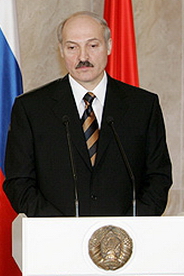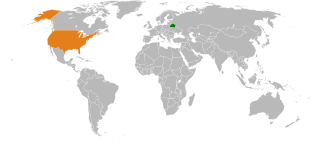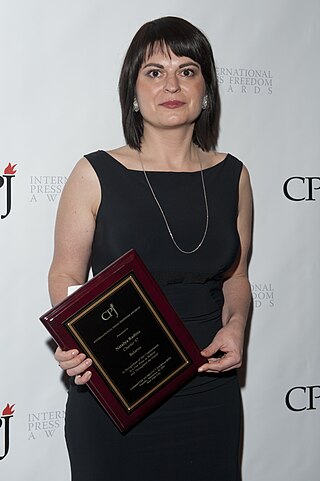Reaction by Belarus
After the airdrop Studio Total released several short video-clips of the operation. A number of videos, made by Belarusians who observed the drop, of parachuting teddy bears were posted on YouTube and went viral. However, the initial reaction both by the Swedish media and by the Belarusian state media, to the Studio Total claims of the airdrop, was skeptical. [10]
Initial official denials
The Belarusian authorities initially issued stringent denials that the teddy bear airdrop ever occurred and that there was no unauthorized intrusion of the Belarus air space on July 4. Belarusian government officials claimed that the Studio Total video of the drop was fake and characterized it as a "hoax" designed to embarrass the Belarus government. [11] About a week after the drop Studio Total released about 90 minutes of raw unedited video-footage taken during the July 4 flight. Radio Free Europe examined the footage and concluded that it appeared to be authentic. [3] Nevertheless, the Belurasian government continued to deny that the airdrop happened. [12]
Arrests of journalists
On July 13, authorities in Belarus arrested a 20-year-old student journalist, Anton Suryapin, who posted on his website, Bnp.by, some of the first photos related to the teddy bear airdrop. [13] Suryapin wrote on his website that he was e-mailed the photos by one of the local residents who observed the drop. Several days prior to Suryapin's arrest, the police in Minsk arrested a realtor, Syarhei Basharimau, who had rented an apartment in the capital to two Swedes connected with Studio Total. Representatives of Studio Total claim that neither Suryapin nor Basharimau were in any way involved in planning and conducting the airdrop and called for their release. [4] [14] Several human rights organizations, including Amnesty International [14] also called for Suryapin's release. Both Suryapin and Basharimau, who have been formally charged, were released on bail on August 17, 2012 and faced up to seven years imprisonment. [15] The Belarusian government publicly lifted the bail conditions and announced that the criminal case was closed on June 28 2013. [16]
In early August 2012 two journalists, Irina Kozlik and Yulia Doroshkevich, who took photos of teddy bears in solidarity with Suryapin and Basharimau, were arrested in Minsk and then convicted of "violating the law on protests" and fined the equivalent of several hundred U.S. dollars. [6] [17]
July 26 acknowledgement
After three weeks of denials by the Belarusian authorities that the event actually occurred, on July 26, President of Belarus Alexander Lukashenko finally acknowledged that the July 4 teddy bear airdrop did take place. [2]
Sacking of Belarusian military officials

President Lukashenko was reported to have been greatly angered by the teddy bear airdrop and by the failure of the Belarusian military to intercept it, which he viewed as a significant national security lapse. He indicated that those officials responsible for this lapse will be disciplined: "This plane was discovered in time, but why did the (air defense) authorities not intercept the flight? ... Come on lads. We are all grown up. The guilty ones have to answer for this." [18]
On Tuesday, July 31, 2012, the Belarusian government announced that President Lukashenko had sacked two top generals, the air defense chief Dmitry Pakhmelkin, and the head of the border guards Igor Rachkovsky "for not properly carrying out their duties in safeguarding Belarusian national security." [18] [19]
President Lukashenko instructed the new border guards chief to shoot down any future illegal intruders of the Belarusian airspace: "Unlawful violations of state borders must not be allowed. They must be stopped by all force and means, including weapons, regardless of anything." [20]
Subsequent government actions
On August 11 the Belarus KGB issued summons to the three Swedish organizers of the airdrop, Tomas Mazetti, Hannah Frey and Per Cromwell, to come to Belarus for questioning about the operation within 10 days. [21] [22] The summons were posted on the Belarus KGB website and delivered to Studio Total by e-mail and stated that failure to comply could result in "correctional work for up to two years, or imprisonment for up to six months." [21] Studio Total refused to comply with the summons and instead offered to discuss the airdrop operation directly with President Lukashenko if he visits Sweden. [23]
Belarus also sent an official request to the government of Lithuania for help "to investigate a possible breach of the state border when a Swedish-piloted light aircraft crossed the Lithuanian-Belarus border." President Lukashenko was quoted by Interfax saying that "Lithuania should not be sitting like mice under a broom. They must answer to us why they provided their territory for national border violation. If there is anyone who won't find it funny, it is Lithuania". [24]













